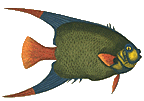
HEAVEN
BY RUPERT BROOKE
FISH(fly-replete, in depth of June,
Dawdling away there wat'ry noon)
Ponder deep wisdom, dark or clear,
Each secret fishy hope or fear.
Fish say, they have their Stream and Pond;
But is there anything Beyond ?
This life cannot be All, they swear,
For how unpleasant, if it were.
One may not doubt that,somehow, Good
Shall come of Water and of Mud;
And, sure, the reverent eye must see
A Purpose in Liquidity.
We darkly know, by Faith we cry,
The future is not wholly dry.
Mud unto mud!--Death eddies near--
Not here the appointed End, not here !
But somewhere, beyond Space and Time,
Is wetter water, slimier slime !
And there (they trust) there swimmeth One,
Who swam ere rivers were begun.
Immense, of fishy form and mind,
Squamous, omnipotent, and kind;
And under that Almighty Fin,
The littlest fish may enter in.
Oh ! never fly conceals a hook,
Fish say, in the Eternal Brook,
But more than mundane weeds are there,
And mud, celestially fair;
Fat caterpillars drift around,
And Paradisal grubs are found;
Unfading moths, immortal flies
And the worm that never dies.
And in that Heaven of their wish,
There shall be no more land, say fish.
Molly Notes:
As yes. Heaven is not a place. It's a construction project with cranes of imagination, scaffolds of hope and front end loaders of resentment.
Truer words were never spoken that by this poet, a person who exemplifies the truism that you don't have to be swift in other ways to be a great poet (something like T.S. Elliot). Rupert Brooke (1887-1915) was born into the English middle class and eventually won a scholarship to Cambridge. As the son of a schoolmaster at Rugby he exerted himself to appear more upper class than his upper class peers. He became acquainted with the Bloomsbury group and was widely admired by them. If he couldn't impress people by his brilliance he could always impress them with what was called his "boyish charm" and good looks. He could play on anybody that way for Brooke was bisexual in a time when the word to describe such a thing was hardly current.
Brooke was the classic "overachiever". He struggled to charm and write his way to the admiration of an audience of upper class people that he never felt he could truly belong to just as he could not belong sexually to either the dominant Victorian/Edwardian form or the every present subculture of upper class English homosexuality. His early work was his greatest. While it may appear rather juvenile with its obsession with death it occasionally threw off great sparks such as the above poem.
Brooke's quest to appear more true blue British than the upper class he had graduated into led to his early death. His cuteness came to the attention of Winston Churchill, then First Lord of the Admiralty, and he was commissioned as a naval officer in 1914. He participated in the Navy's 1914 Antwerp expedition in 1914, and in 1915 he died from a disease transmitted by a mosquito bite on his way to the total disaster of the Gallipoli expedition. A rather sad and less than glorious end. Churchill wrote his obituary, saying "he advanced to the brink...with absolute conviction of the rightness of his country's cause".
Probably true. As Brooke attempted to out Blimp the Blimps his latter poetry became jingoism worthy of being the obverse side of the coin of "socialist realism". His volume of 'War Sonnets', written during WW1 became quite famous. The English government built a myth around him in an attempt to encourage recruiting- to such an extent that his first name "Rupert" became slang in the British army for the sort of gung-ho idiot officer produced by the upper class English public schools.
Today there are statues and monuments of and to Brooke in numerous places in England and out here in the "colonies" such as at the Canadian Royal Military College in Kingston, Ontario. Generations of suffering school children have been forced to memorize the opening lines from his poem 'The Soldier';
"If I should die think only this of me:
That there's some corner of a foreign field
That is forever England"
All of the teachers and, of course, all of the good patriots will always neglect to mention Brooke's sexuality when teaching him or eulogizing him. Doesn't make good copy I guess.
No matter how silly the tributes to the undying British Empire may appear in this century a casual reading seems to say that they were a cut above what is preferred by "intellectuals" celebrating our present world power- America. That's however, something for the next century to judge properly. Find me a poem, however, celebrating the American invasion of Iraq.
For the other side of what happened in WW1 poetry wise look up the poet Siegfried Sassoon and what he had to say about the war.
Molly
No comments:
Post a Comment